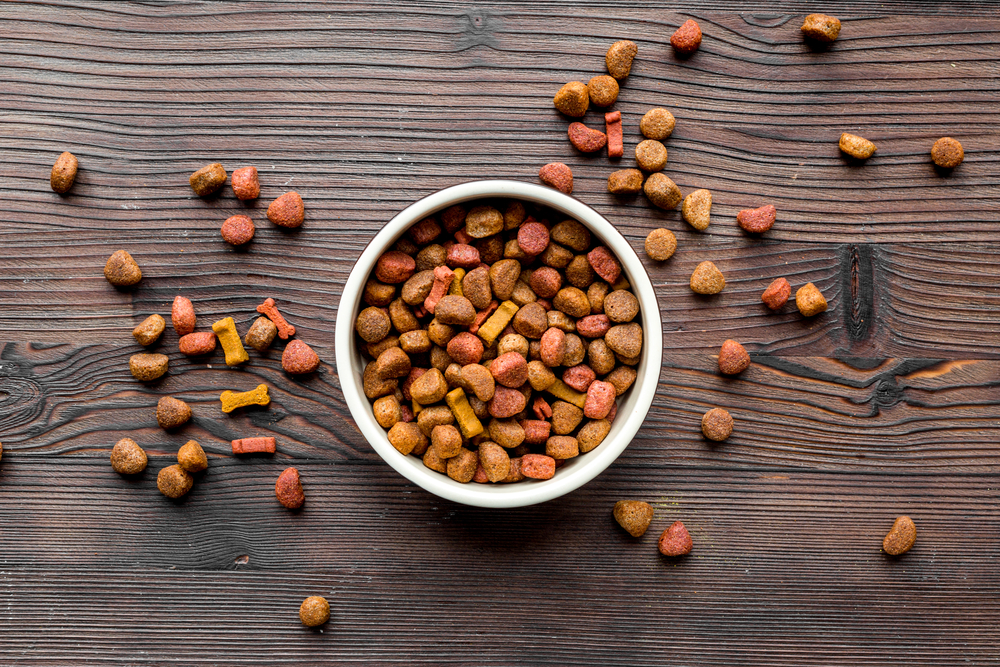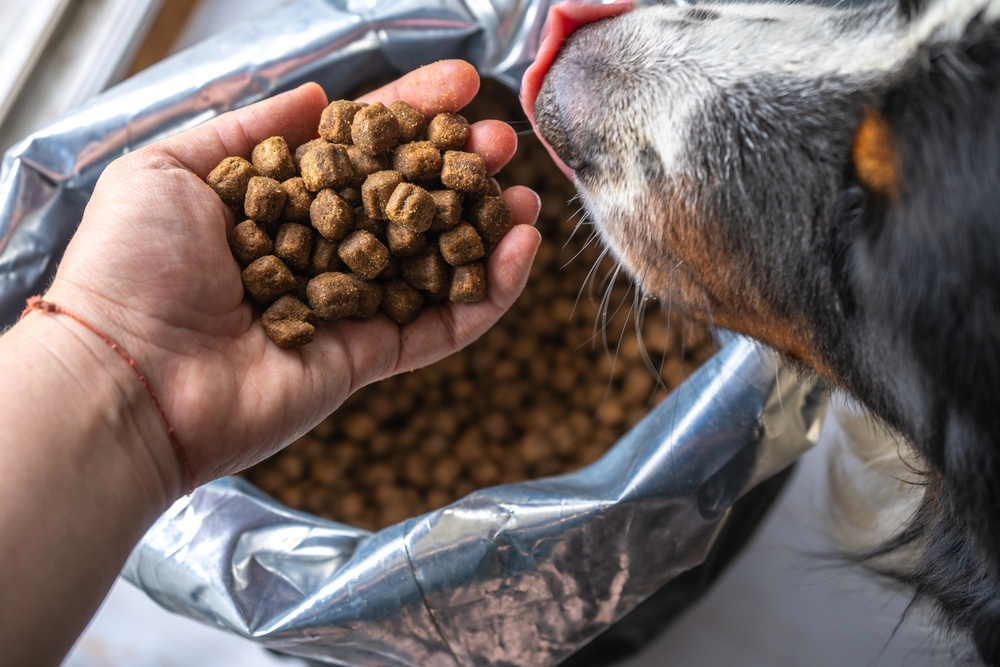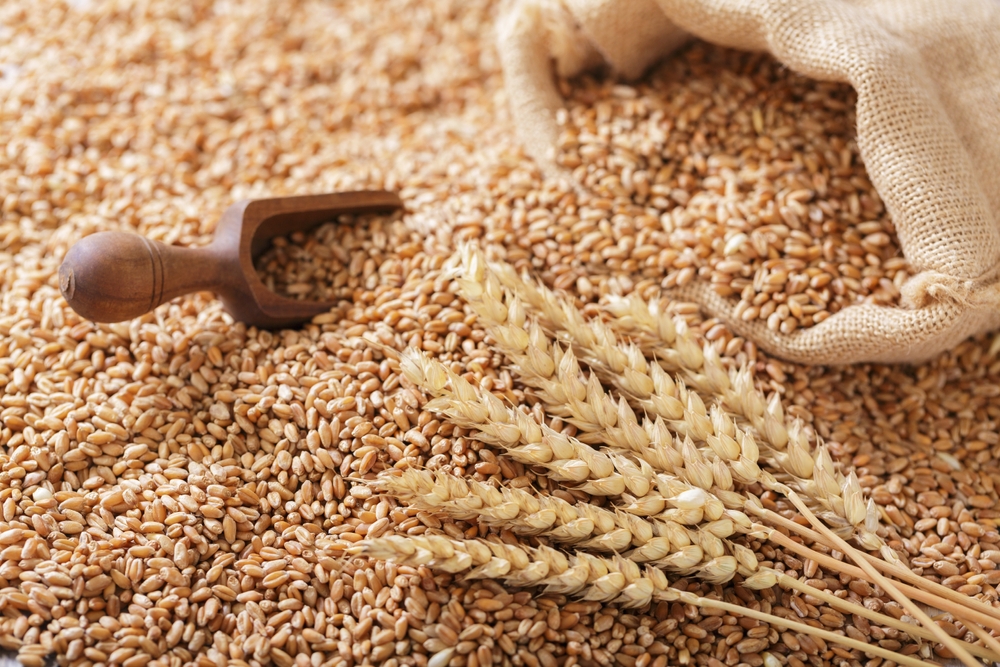Click to Skip Ahead
What is dry matter basis and why is it important for pet food? We’ve got the answers—and a calculator—to help you determine the ratio of nutrients to moisture content.
When looking at the nutritional values of pet food, the guaranteed analysis listed on the package is misleading because it’s based on the total weight. To get a correct reading, you need to eliminate the moisture content to find a proper distribution of nutrients.
Sound confusing? Don’t worry. Our calculator will take the mystery out of the process, giving you a more accurate reading of nutritional analysis in your pet’s food.
Our Handy Calorie Calculator
Since we are serious about math and nutrition, we thought you might want to check out our handy dog calorie requirements calculator. This calculator can help you figure out approximately how many calories a dog requires to consume per day. If you’re wanting to learn more about how to calculate dry matter continue reading the article below.
The exact amount of calories an individual animal needs to maintain a healthy weight is variable and influenced by many factors including genetics, age, breed, and activity level. This tool is meant to be used only as a guideline for healthy individuals and does not substitute veterinary advice
Why Reading Labels Doesn’t Tell the Full Story
Pet food labels carry many of the same rules and restrictions that labels for human food do. There are specific things that have to be listed, including the nutrient profile of the food. Any pet food you look at should have percentages of protein, fiber, fat, and moisture on the label. There may be other nutrients listed as well, but these are the main ones that you should be looking at.
So, you look at dry dog food and see that it’s 40% protein, which is perfect for your highly active dog. But you prefer to feed your dog a mixture of wet and dry food, so you look at a few cans of food and realize that you’re looking at protein percentages around 10-15%, with a few that are higher or lower. This makes you wonder if kibble actually is that much more nutrient-sound than wet food. A 30% protein difference is significant, and that’s putting it lightly. Why does all this matter, and how can you apply it to choosing a food for your dog?

What Is Dry Matter Basis & Why Is It Important?
Dry matter basis is the nutrient profile of a food without accounting for the moisture in the food. As you can imagine, comparing the 40% protein kibble and the 10% protein wet food looks quite different when you remove moisture from the equation. Calculating dry matter basis means you can compare apples to apples when it comes to pet food, allowing you to pick the most nutrient-sound food for your dog.
Labels on pet food can be misleading when it comes to nutrient profiles, and this is less about companies being dishonest and more about companies being held to a specific standard of labeling that doesn’t adequately compare products. This results in some products looking much higher in nutrients than they are while other products are left in the dust, even though they’re actually higher in nutrients than other products.

What Are Ideal Dry Matter Basis Results?
Unfortunately, there’s no easy answer to this one because the ideal dry matter basis is going to vary significantly for each dog. Dogs have varying calorie and nutrient needs based on age, health status, activity level, and whether or not they are spayed or neutered.
For an active dog that participates in daily sports, a dry matter basis of 40% protein may be perfect. For a dog with kidney disease, a dry matter basis of 40% protein is much higher than the dog’s kidneys can handle. Active dogs can tolerate a higher fat content in their food without weight gain than sedentary dogs can.
A great starting point for determining the ideal dry matter basis results for your dog is consulting with a veterinary nutritionist or even your regular veterinarian. They will be able to give you educated guidance to help you make the best decision for your dog.
What About Wet Food for My Dog?
Wet food has its pros and cons, so you have to weigh those against each other to determine if you will feed your dog wet food and, if so, how much. Wet food may have a higher dry matter basis than dry food, but because it’s a smaller quantity of actual food, you have to feed more of it. Wet food is usually a much more expensive route than feeding kibble. As well, wet food needs a larger storage space and has a much shorter shelf life once opened than dry food.
Wet food usually is moisture-rich, though, and far more palatable to some dogs than dry food is. It provides more options for dogs that need more water in their diet, and it usually has a lower dry matter basis of carbohydrates than dry food, meaning it’s often a better option for dogs. Wet food is usually preferred for dogs with sensitive teeth or digestive problems. Choosing to feed your dog wet food or not is entirely up to you and your veterinarian to decide.
If you need to speak with a vet but can’t get to one, head over to PangoVet. It’s an online service where you can talk to a vet online and get the personalized advice you need for your pet — all at an affordable price!
How to Use a Calculator for Dry Matter Basis Nutrients
The dry matter basis helps to establish the actual content of each nutrient in a food after removing the moisture content. It can be found first by removing the percentage of moisture content, so subtracting it from 100.
- Find out the percentage of moisture in the food from the guaranteed analysis.
- Enter 100 into your calculator followed by the subtraction sign, then enter the moisture content.
- Note down the number. This is the total dry matter content.
- You calculate what the dry matter content is of each nutrient with the following formula. For example, to find out protein content in a dry matter basis, you first need to find out the guaranteed analysis percentage of protein.
- Enter that number in your calculator and divide by the total dry matter content.
- Multiply the result by 100 and have the protein content expressed as a percentage of the dry matter basis.
- Repeat steps 4, 5, and 6 for each nutrient of interest.
While it is very useful to know how to manually calculate each nutrient content on a dry matter basis, we are lucky to live in an era where handy resources make life easier for us. This handy calculator might be your go-to instead.
Please note that since carbohydrates are not required to be included in the guaranteed analysis, if you wish to know their content, you will have to calculate it beforehand. You can learn how to do it by reading: How to Calculate Carbohydrates in Dog Food: Our Vet Explains the Math & Considerations.
Conclusion
Calculating the dry matter basis of dog foods can provide you with excellent guidance when it comes to choosing the best, most nutrient-dense food for your dog. Practicing the equation until you are comfortable with it will help you significantly when you are in the store and need to compare foods. This way of determining the nutritional value of a food is becoming more popular because of how effective it is. Hopefully, manufacturers will start putting the dry matter basis on labels. Until then, you have the tools you need to calculate it yourself.
See also:
Featured Image Credit: zkolra, Shutterstock













